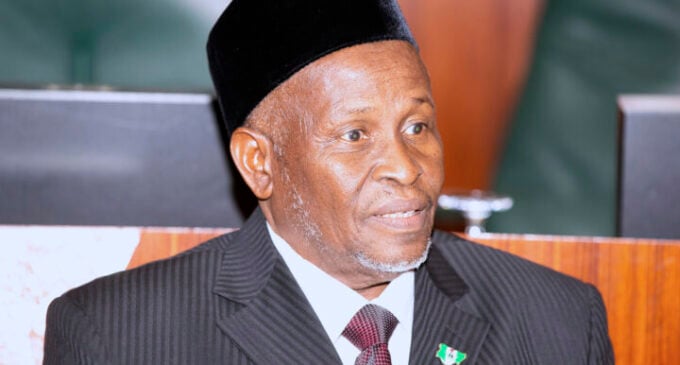‘FG files more charges than it can prove’ — CJN speaks on delay in high-profile cases

Ibrahim Muhammad, chief justice of Nigeria (CJN), says the federal government files more charges than it can prove in court.
The CJN said this in reaction to the claim by Abubakar Malami, attorney-general of the federation, that the judiciary is to blame for delays in prosecuting high-profile cases.
In an interview on Channels Television’s ‘Politics Today’ on Monday, Malami said the federal government has employed measures to ensure speedy dispensation of cases, and that once a matter is brought before the court, it becomes a judiciary affair.
“As far as the present administration is concerned, delay of cases does not arise. If you are looking at it from the perspective of the legislative framework, we are enforcing provisions of the Administration of Criminal Justice Act (ACJA), as in day-in-day-out prosecution of cases,” he said.
“You cannot, by any stretch of imagination, place blame associated with the conclusion and determination of the case on the doorsteps of the executive. It is exclusively a judicial affair.
“We have taken steps to provide the legislative framework. We have taken steps in due diligence of prosecution of cases, which as a result of multiple convictions within a span of a year, is a clear pointer that we have indeed promised and delivered.”
However, in a statement on Tuesday, the CJN, through his spokesperson, Isah Ahuraka, described Malami’s position as “one-sided”.
“The judiciary by its constitutional position does not have criminal investigation unit or ‘fraud detective squad’ to detect and investigate criminal involvement of any person, neither does it have a garrison command to fight its cause or enforce its orders and decisions,” the CJN said.
“More often than not, the federal government’s prosecution sector files more charges than it can prove or provide witnesses to prove, ostensibly at times for the prosecution to even fail.”
He said the ACJA referred to by the minister “is infected with sores in some parts, making speeding adjudications improbable in some instances, in addition to high volume of cases, limited number of judges, poor infrastructure or archaic equipment”.
Muhammad added that Malami’s allegation that the judiciary has not been transparent in its budget spending is untrue.
“Although judiciary has refrained from joining issues all this while but to state the facts, in line with the budget call circular and ceiling the federal government sent to the judiciary before the commencement of the fiscal year, the judiciary prepares its budget estimates for capital, overhead cost and personnel cost according to the ceiling, needs and priority,” he said.
“The judiciary defends its budget before the senate and the house of representatives committees on judiciary at the national assembly, besides the initial vetting by the executive.
“The judiciary has an internal mechanism for budget control and implementation. Each court and judicial body has a budget unit, the account department, internal audit, due process unit, as well as departmental tenders board. There is also a due process committee at the NJC and the judicial tenders board that award contracts on expenditure above the approval limit of the accounting officers of the courts and judicial bodies.
“These layers of control were established by the judiciary to ensure transparency, accountability and effective budget implementation. The type of transparency that the federal government has stressed.”
The CJN also stated that the national assembly carries out an oversight function as empowered by sections 88 and 89 of the 1999 constitution, which also mandates it “to expose corruption, inefficiency or waste in the execution or administration of laws within its legislative competence and in the disbursement or administration of funds appropriated by it”.
“The executive also put in place some mechanism to monitor budget implementation and accountability in the judiciary through its organs like the office of accountant-general of the federation and auditor-general of the federation and other agencies where the need arises,” he said.
“Apart from the internal audit units of the judiciary, the Federal Audit Department maintains offices in all the courts and judicial bodies that monitor spending in the judiciary. If the federal audit raises a query on any transaction and it is not well defended, it sends such to the public account committees of the national assembly. Officials of the judiciary would be invited to explain themselves.
“The question to ask is who else should the judiciary open its account books to and who among these organs had raised exceptions which were not defended by the third arm? The answer is none.
“One only hopes that these allegations against the judiciary by the federal government is not just a way of giving a dog a bad name so as to then hang it.”













There are no comments at the moment, do you want to add one?
Write a comment